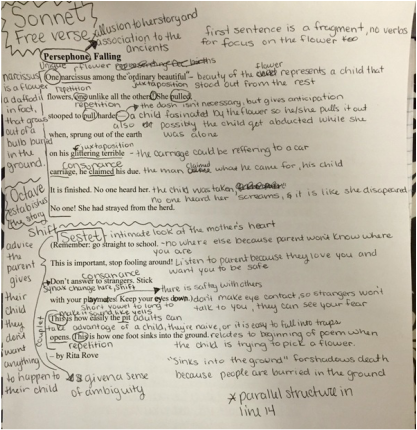

That's "Persephone, Falling." Persephone, a headstrong young goddess, is abducted by Hades, the king of the underworld, because of her recklessness, because she didn't listen to her mother's advice. It's like they wish they could wrap us in bubble wrap until we're old enough and smart enough to be on our own. It's so easy for us to roll our eyes at them, watching them sweat when we take two stairs at a time. Where do adults come up with this stuff? A thousand ridiculous little pieces of advice. And she had a million reasons why we should: "They'll make you big and strong!" "They'll give you super eyesight!" "They'll help your brain!" Okay, how could something that looked so much like little slivers of monkey brain be good for our brains? We would sit up in a standoff with Mom, who wouldn't let us up from the table until we'd eaten every last one. We aren't sure what vegetable it was for you when you were a kid, but for us at Shmoop, it was cooked carrots. What is Persephone, Falling About and Why Should I Care? Like Nikki Giovanni and Maya Angelou, she's been one of the most important African-American female voices of the late twentieth century. Rita Dove knows a lot about high honors her poetry has earned her a Pulitzer Prize, among a ton of other awards. Seriously, though, it's one of the highest honors a poet can receive. Being the Poet Laureate is sort of like being the president, just without the oval office and instead of running a country, you know, you write poems. In fact, she published "Persephone, Falling" during her time as Poet Laureate of the United States.
#RITA DOVE PERSEPHONE FALLING FREE#
Yep, it turns out when you're free to do what you want, you're free to write spectacular poetry, and that's definitely true of Rita Dove.

To be fair, one of the dangers is becoming awesome (there are others). She uses the story of this mother-daughter duo to examine every child's longing to be free, and every parent's fear of the dangers that freedom could lead to. In "Persephone, Falling," Dove draws on the Greek goddesses Demeter and Persephone (lots more on those two later), a rather famous mother-daughter pair, to channel her thoughts and feelings on the sticky subject. But that's only fitting, because she published the poem in 1996 as part of her collection Mother Love, which is about the often messy, rarely simple relationships between mothers and daughters. Rita Dove's poem "Persephone, Falling" takes mommy issues to a mythological level.


 0 kommentar(er)
0 kommentar(er)
